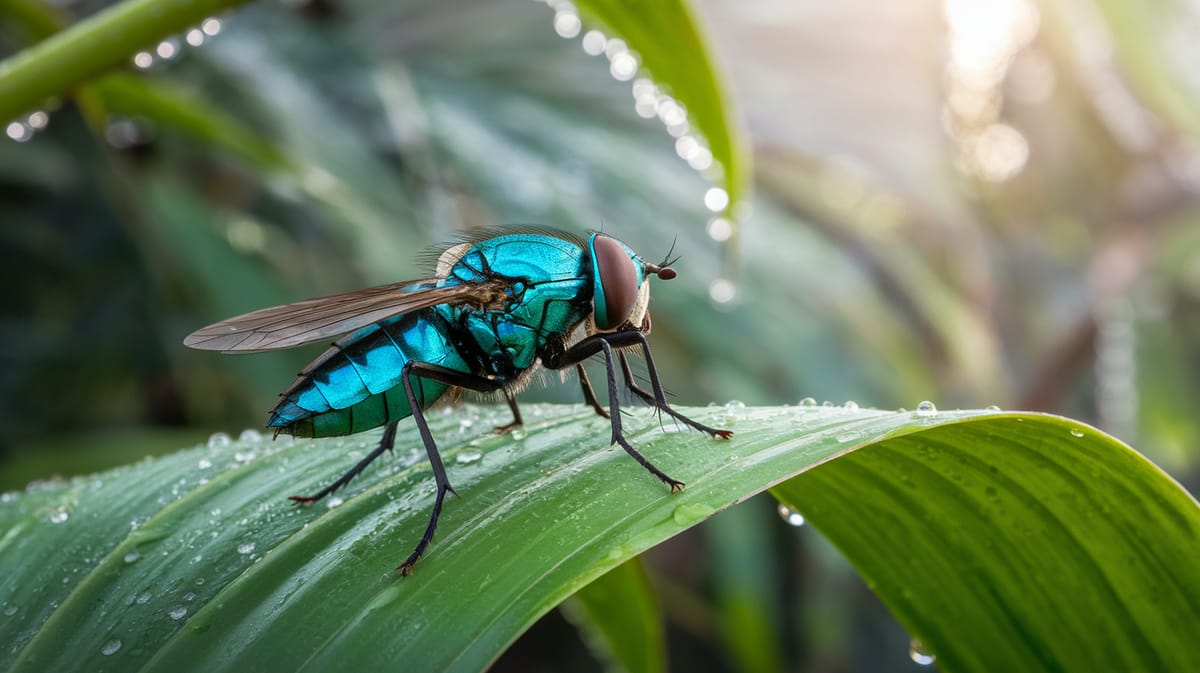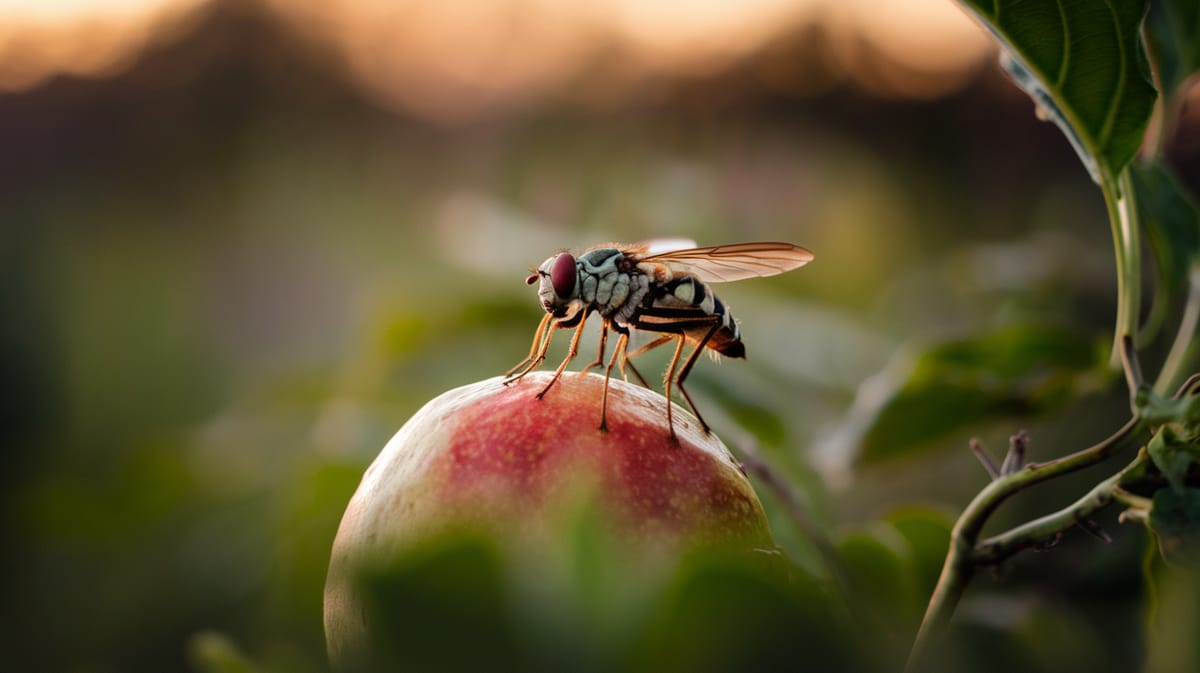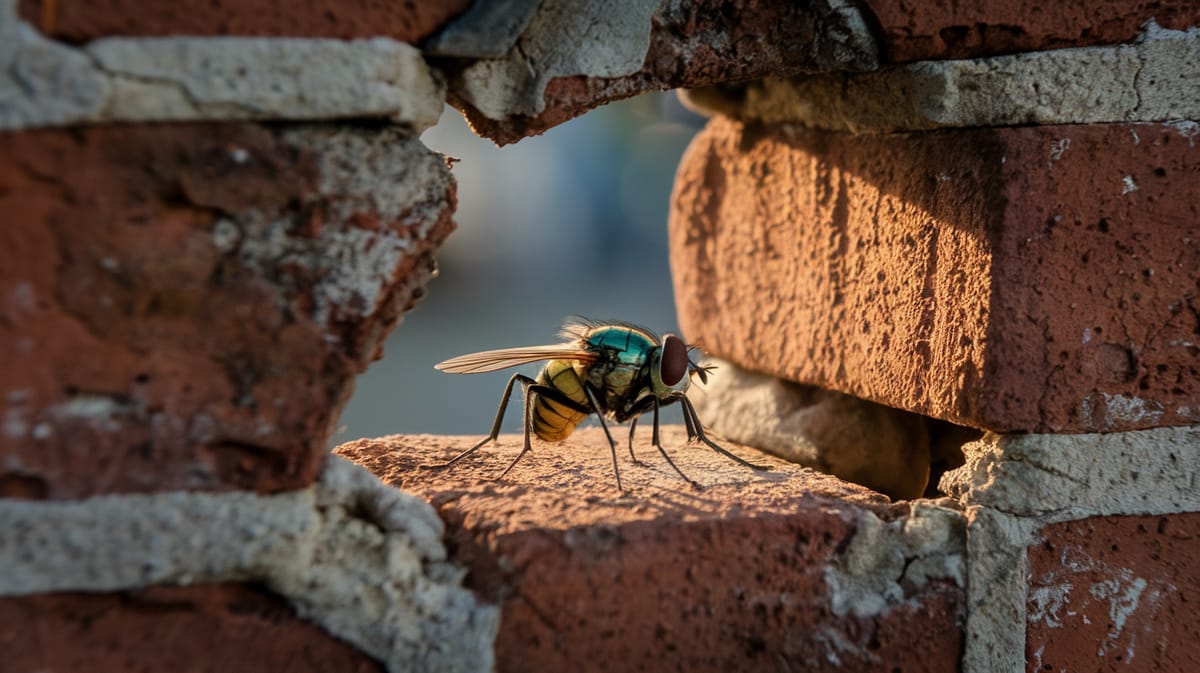Blow Fly
Metallic and buzzing, the Blow Fly plays a crucial role in decomposing organic matter. Its larvae are nature's clean-up crew, breaking down waste and enriching soil.

Key Insights at a Glance
Did You Know?
Taxonomy & Classification
Blow flies are efficient decomposers, utilizing their acute sense of smell and rapid breeding to scavenge and recycle nutrients. Let's understand the evolutionary journey and classification of these remarkable decomposers.
Global Presence
Blow flies, encompassing over 1,100 species, thrive on every continent except Antarctica, adapting to diverse environments.
Evolutionary Adaptations
Originating about 65 million years ago, blow flies evolved with specialized larval feeding habits, crucial for ecological balance.
Lifecycle and Growth
A remarkable journey of transformation from Egg to Adult.
Egg
Blow Fly eggs are laid in clusters on decaying matter, hatching swiftly into larva within a day.
Larva
Known as maggots, larvae feed voraciously on decomposing material, growing rapidly in size through several molts.
Pupa
Pupation occurs in a hard shell, where the larva transforms into a fully developed adult fly.
Adult
Adult flies emerge ready to mate, continuing the cycle, and often lay eggs within a day of emergence.
Dietary Habits
A scavenger with keen olfactory skills, this insect thrives on decomposing organic matter and opportunistically exploits various food sources.
| DIET TYPE | DESCRIPTION |
|---|---|
| Primary Diet | Feeds primarily on rotting meat, carrion, and feces, playing a vital role in decomposition. |
| Secondary Diet | Consumes decaying plant material and fermenting fruits when animal matter is less available. |
| Occasional | Occasionally feeds on open wounds of animals, using its adaptable feeding habits to exploit available resources. |

Behaviour and Adaptations
Discover the fascinating traits that make the Blow Fly a master of survival and adaptation.
Rapid Reproduction
Blow flies lay hundreds of eggs, ensuring swift population growth.
Efficient Decomposition
Larvae rapidly break down organic matter, aiding nutrient recycling.
Acute Olfactory Sense
Highly sensitive to odors, locating food sources from afar.
Ecosystem Impact
Supporting ecological balance through Blow Fly contributions.
Decomposition Aid
Accelerates the breakdown of organic matter, enriching soil with nutrients.
Pollination Partner
Facilitates pollination for certain flowering plants in their search for nectar.
Food Chain Component
Provides essential sustenance to predators like birds and amphibians.
Conservation Challenges
Understanding and addressing the major threats to Blow Fly populations.
Chemical Exposure
Pesticides and industrial chemicals significantly harm blow fly larvae and adults.
Habitat Degradation
Urbanization and deforestation reduce essential blow fly breeding and feeding sites.
Climate Change
Altered weather patterns impact blow fly life cycles and distribution.
Frequently Asked Questions
How long do Blow Fly live?
Blow Flies typically live for about two to four weeks. Their life cycle includes egg, larval, pupal, and adult stages. Environmental conditions like temperature and humidity can influence their lifespan.
What do Blow Fly eat?
Blow Flies primarily feed on decaying organic matter. Adults are attracted to carrion, feces, and garbage, where they also lay eggs. The larvae, or maggots, consume decomposing tissue, playing a crucial role in nutrient recycling.
Are Blow Fly poisonous?
Blow Flies are not poisonous, but they can spread bacteria and pathogens due to their association with filth. Their presence can indicate unsanitary conditions, posing potential health risks if they contaminate food or surfaces.
Are Blow Fly endangered?
Blow Flies are not endangered. They are widespread and common, found in various environments worldwide. Their adaptability to different habitats and food sources contributes to their stable population.
What do Blow Fly symbolize?
Blow Flies often symbolize death and decay due to their habitat preferences and life cycle. In literature and folklore, they can represent transformation or the cycle of life, given their role in decomposition and nutrient recycling.
Do Blow Fly bite?
Blow Flies do not bite humans. They lack the mouthparts needed for biting. Instead, they feed on liquid or semi-liquid substances through sponging mouthparts.
What color are Blow Fly?
Blow Flies are typically metallic in color, with shades of blue, green, or black. Their shiny, iridescent appearance makes them easily recognizable among other fly species.
Does a Blow Fly have wings?
Yes, Blow Flies have wings. They possess a single pair of wings like other members of the order Diptera, enabling them to fly efficiently and cover large distances in search of food and breeding sites.
What does a Blow Fly look like?
Blow Flies are medium-sized with a metallic body, often blue or green. They have red compound eyes and clear wings. Their larvae, known as maggots, are legless and white or cream-colored.
Is a Blow Fly an insect?
Yes, a Blow Fly is an insect. They belong to the order Diptera, which includes all true flies. Like other insects, they have a three-part body structure consisting of a head, thorax, and abdomen.
Related Insects
Discover insects with similar characteristics to Blow Fly - including shared habitats, diets, and taxonomic classifications
Share this profile
Help others discover Blow Fly
